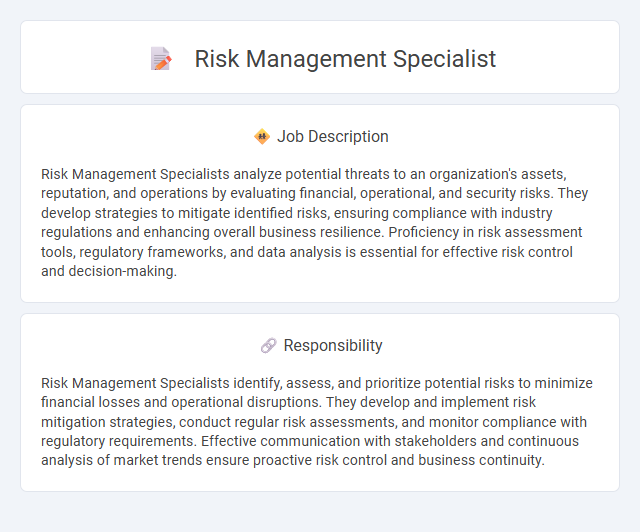
Risk Management Specialists analyze potential threats to an organization's assets, reputation, and operations by evaluating financial, operational, and security risks. They develop strategies to mitigate identified risks, ensuring compliance with industry regulations and enhancing overall business resilience. Proficiency in risk assessment tools, regulatory frameworks, and data analysis is essential for effective risk control and decision-making.
Individuals with strong analytical skills and a calm demeanor under pressure are likely to excel as Risk Management Specialists. Those who enjoy problem-solving and can make data-driven decisions while managing uncertainty may find this role suitable. However, people who prefer predictable work environments or struggle with complex risk assessments might face challenges in this position.
Qualification
A Risk Management Specialist must possess a strong foundation in finance, economics, or business administration, often supported by a bachelor's or master's degree in these fields. Proficiency in risk assessment tools, statistical analysis, and regulatory compliance is essential, alongside certifications such as Certified Risk Manager (CRM) or Financial Risk Manager (FRM). Effective communication skills and experience with risk management software further enhance the ability to identify, evaluate, and mitigate potential risks across various industries.
Responsibility
Risk Management Specialists identify, assess, and prioritize potential risks to minimize financial losses and operational disruptions. They develop and implement risk mitigation strategies, conduct regular risk assessments, and monitor compliance with regulatory requirements. Effective communication with stakeholders and continuous analysis of market trends ensure proactive risk control and business continuity.
Benefit
Risk Management Specialists likely enhance organizational stability by identifying and mitigating potential threats, which may reduce financial losses and operational disruptions. Their expertise probably supports informed decision-making, contributing to improved compliance with regulatory requirements and increased stakeholder confidence. Companies employing Risk Management Specialists might experience greater resilience and a competitive advantage in uncertain markets.
Challenge
Risk Management Specialists likely face complex challenges in identifying and assessing potential threats that could impact organizational objectives. They probably need to develop robust strategies to mitigate risks while balancing cost and operational efficiency. The evolving regulatory landscape and emerging risks may further complicate their decision-making processes.
Career Advancement
A Risk Management Specialist leverages expertise in identifying, analyzing, and mitigating potential threats to safeguard organizational assets and ensure regulatory compliance. Mastery of risk assessment tools, industry-specific regulations, and strategic decision-making enhances opportunities for career progression into roles such as Risk Manager, Compliance Officer, or Chief Risk Officer. Continuous professional development through certifications like CRM (Certified Risk Manager) and experience in data analytics significantly boosts advancement potential in this rapidly evolving field.
 kuljobs.com
kuljobs.com